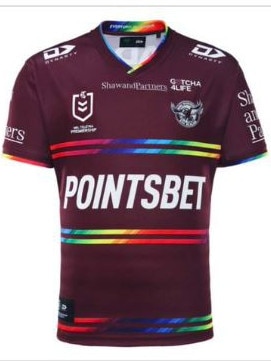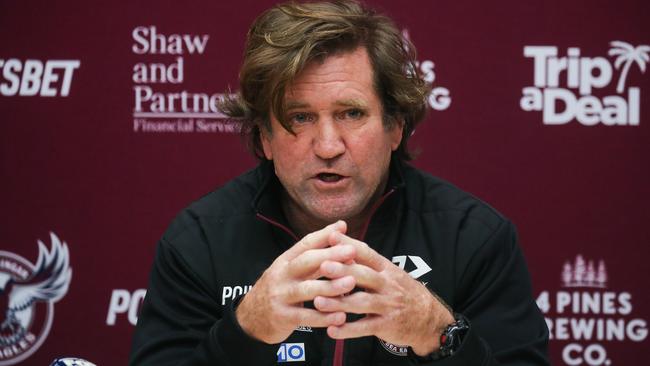David Penberthy: Some feel-good corporate events held here would make you roll your eyes
I suspect most Australians have absolute zero interest in the sexual interests of their work mates, writes David Penberthy.
Opinion
Don't miss out on the headlines from Opinion. Followed categories will be added to My News.
If the desired outcome of the Manly Sea Eagles rainbow jersey was an outpouring of unity, you could say by way of understatement it’s been the opposite of a roaring success.
The ham-fisted manner in which this idea was implemented, without consultation from the players, the job falling unfairly to the club’s hapless coach to explain the debacle, has been a case study in how not to progress a progressive cause.
Much has been made of the religious beliefs of the seven players who refused to wear the jersey and were as such precluded from playing in Thursday night’s game.
I am not religious, devoutly so, and as such have no time for fantastical concepts such as people being accepted or barred from an imagined heaven on the basis of the way they were born or choose to live.

I would defend those people from accusations of hatefulness, though. Indeed the zany internal logic of someone like Israel Folau seems to be that he loves God, and God loves everyone, so it is therefore his moral duty to warn everyone headed for the fires of hell that they’d better straighten up quick smart and start acting “normally”.
In his own nutty way, Folau sees himself as an agent of love, not hate. Perhaps that’s the same way these seven Manly players see it.
To be honest, we really don’t know what they think, as their position has only been explained by others who are busier with the business of damage control as the club tries to manage this shambles.
There might be another explanation for the players’ ambivalence toward the jersey idea. It is one that is worth reflecting on as workplace culture changes with the rise of what’s known as ESG in the business world. ESG stands for Environmental, Social and Governance, and it’s a kind of in-house assessment program where businesses rate themselves on their understanding and application of social justice principles, ranging from everything from environmental policies, reconciliation plans, gender equality, LBTIQ awareness and so on.
Much of this involves the attendance of courses for staff that go beyond the traditional workplace behaviour and harassment stuff and into a more activist space, where many modern corporates now want to see themselves (and crucially, be seen) as at the forefront of social change.
If you google ESG, and you run a company that has money to burn on this kind of malarkey, there are plenty of consultants online who would be happy to come and advise you on it in return for an extravagant fee.
This is partially a noble exercise for businesses. It is also motivated by a desire for continuing profits for companies seeking to insure themselves against social media attacks or any external hit on their reputation for being ideologically impure.
At the end of the day, rugby league players are workers in the same way that dentists are workers and accountants are workers and roadside lollipop people are workers. Perhaps this group of workers just didn’t grasp why the job had fallen to them, during working hours and with no prior discussion, to be shoe horned into becoming the public face of acceptance for the LGBTIQ community.

Progressive people who advocate these kinds of public displays of solidarity need to reflect on the impertinence inherent in the process, and its capacity to harden hearts rather than open them. I know of some feel-good ESG-inspired corporate events that have been held here by businesses in Adelaide that would make you roll your eyes. The end result of all this is people who are open-minded and loving, and who probably voted an enthusiastic yes to the marriage equality plebiscite, can find themselves corralled into attending some excruciatingly virtuous work-sponsored event. And asking why they are wasting their time when they should actually be working.
Much of this involves a kind of public airing of things that many people regard as private anyway.
I suspect most Australians have absolute zero interest in the sexual interests of their colleagues. They can see no reason why any of this should be the subject of a group breakfast or an afternoon session in the staffroom.
There is a reductive quality to all of this, where the reluctance of reasonable people to take part in showy stunts is held up as proof of their bigotry or ignorance. I would cite climate emergencies as a case in point.
I know many people who, like me, believe climate change is real and must be acted on, but also regard the declaration of climate emergencies as wankery of the most perfect kind. This, in the eyes of the relentlessly pure, puts you on the same moral level as Union Carbide.
The debate generated by this Manly story has spun off into a lunatic orbit, where in the minds of some the very concept of maleness is itself on trial.
The funniest contribution I’ve heard comes from federal independent Zali Steggall, who now thinks the entire premise of this innately physical game of rugby league now needs to be examined.
“I feel that this is not about religion, I think this is about a sort of macho masculinity that I think needs to be addressed within rugby league,” she said on the ABC.
They should put her in charge of the marketing for the next State of Origin. Forget “mate against mate and state against state”, perhaps the slogan will be “Can’t we all just get along?”, and instead of six brutal tackles they can all play rock, paper and scissors, lest anyone get upset by the sight of physical contact, with all the hateful subliminal messaging such aggression apparently conveys.





